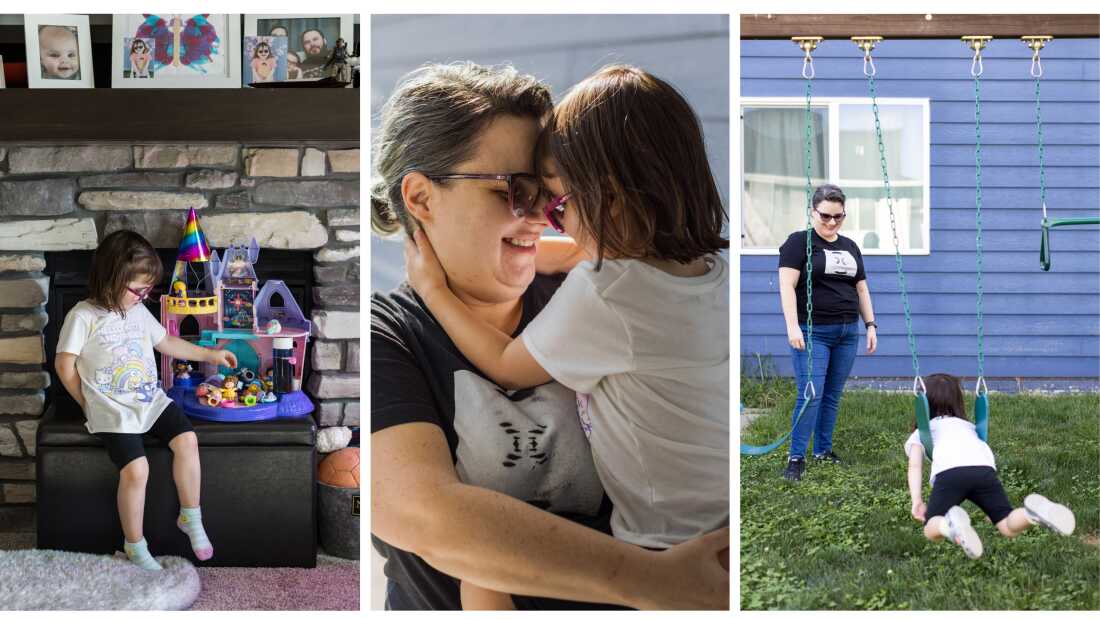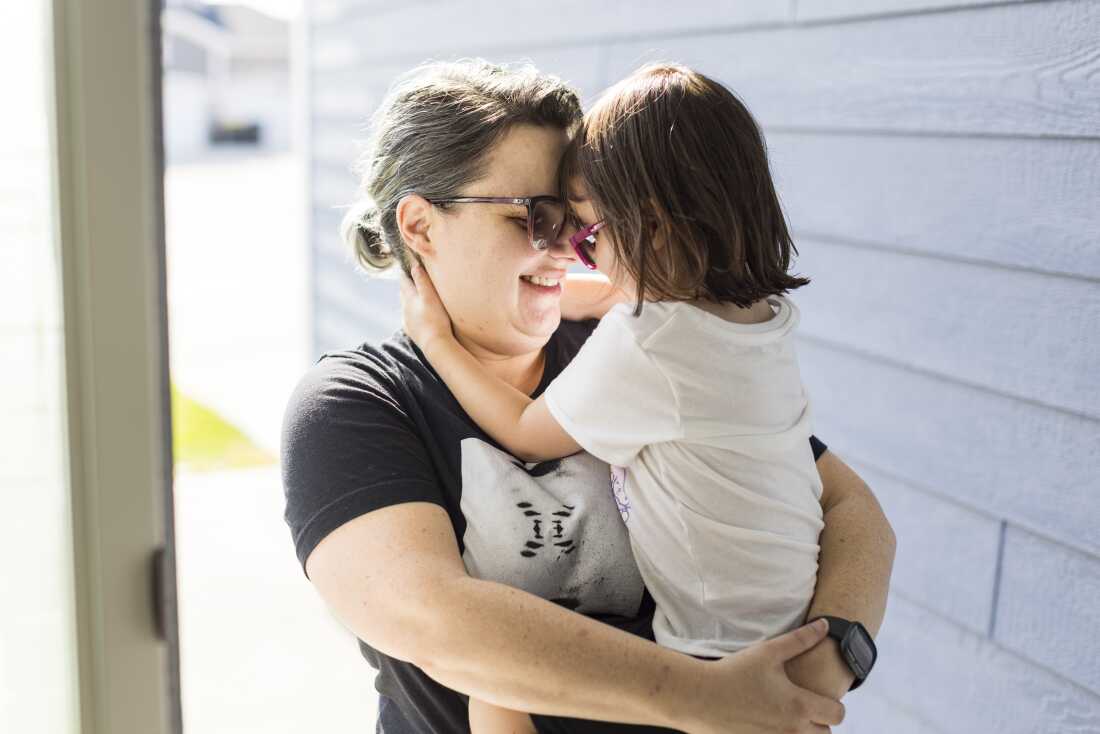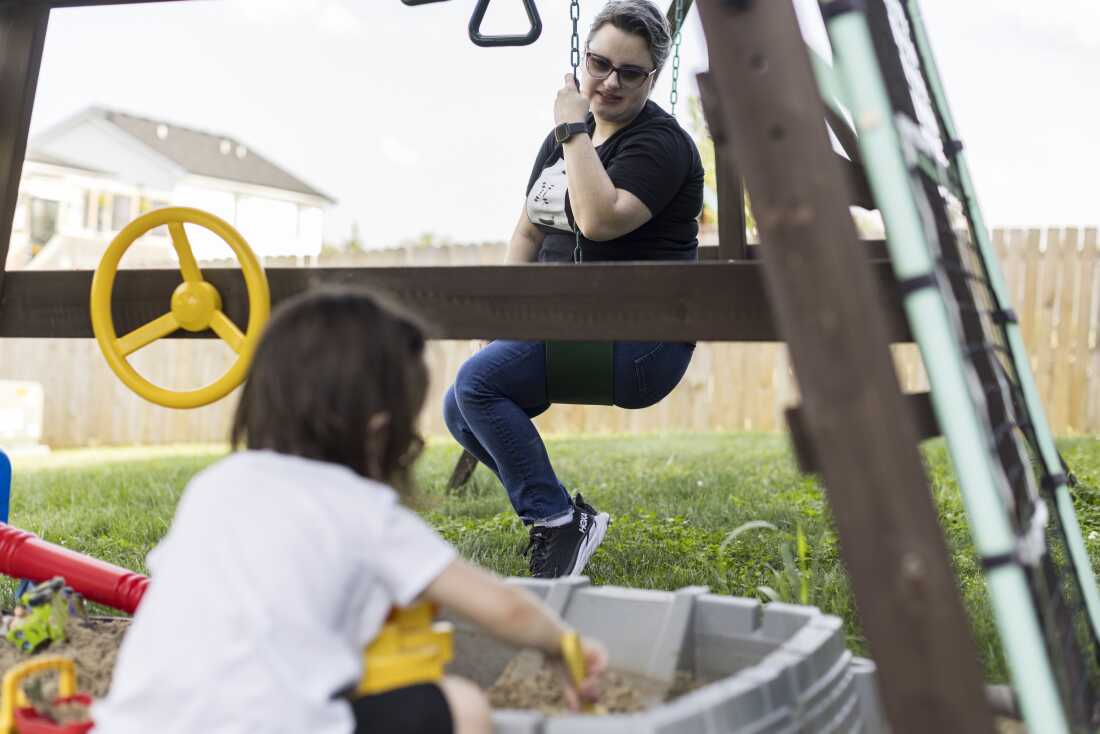
Natalie and her little one at their dwelling in Iowa, a state that bans abortion after six weeks gestation. Within the two years since Roe v. Wade was overturned, 14 states have enacted abortion bans.
Kathryn Gamble for NPR
cover caption
toggle caption
Kathryn Gamble for NPR
Largely, Natalie remembers feeling very, very alone.
At 24 years previous, she was simply out of school, struggling to pay payments and discover a good job. And she or he was pregnant.
“I had form of an on-again, off-again boyfriend, and I used to be taking contraception and we used condoms, so we thought there’s not a extremely good likelihood of getting pregnant,” she says. “However while you’re younger, typically your physique has different concepts.”
She requested NPR to not use her final identify as a result of she fears skilled repercussions for telling her story publicly.
This was 2010. She was residing in Missouri at her uncle’s home, on the lookout for a job the place she might use her bachelor’s diploma in biology and chemistry — particularly one which got here with well being advantages. She had been uninsured since her dad died when she was a young person, and her mother wasn’t round or capable of supply her very a lot assist.
Within the meantime, she was working at a daycare heart and made barely sufficient cash to assist herself.
“I keep in mind the primary $100 that I had in my financial savings account was large — it took me six months,” she says.
When she came upon she was pregnant, she felt trapped.
“I used to be simply pondering of the instant future: What am I going to eat? The place am I going to stay?” she says.
Nevertheless it wasn’t simply Natalie’s instant future that was at stake — it was her long-term monetary safety, too.
Natalie’s expertise illustrates the profound financial penalties that an unplanned being pregnant can have on a lady’s life. The choices ladies make — and the choices which can be obtainable to them — can have lasting results on their funds, their households, and the economic system as a complete. These choices have modified in typically sudden methods because the Supreme Court docket struck down Roe v. Wade two years in the past and allowed states to impose strict limits on abortion.

Natalie’s path to parenthood wasn’t clean. She and her husband went into debt for a failed spherical of IVF. Getting pregnant along with her daughter River got here as a welcome shock.
Kathryn Gamble for NPR
cover caption
toggle caption
Kathryn Gamble for NPR
A taboo dialog
“I imagine that eliminating the suitable of girls to make choices about when and whether or not to have kids would have very damaging results on the economic system and would set ladies again a long time,” Treasury Secretary Janet Yellen instructed a Senate committee some weeks earlier than Roe was overturned.
However a frank dialogue of the financial aspect of abortion nonetheless strikes some folks as taboo.
“It simply feels callous to me,” Sen. Tim Scott, R-S.C., instructed Yellen. “I believe discovering a option to have a debate round abortion and a that means for the financial stability of our nation, is harsh.”
“This isn’t harsh,” Yellen replied calmly. “That is the reality.” She famous that entry to authorized abortion permits extra ladies to affix the workforce, end their training and increase their earnings potential.
The only greatest resolution
Probably the most frequent cause ladies search abortion will not be having the financial assets to care for a kid, based on knowledge from the Turnaway Examine. The landmark analysis mission adopted a whole bunch of girls for years after they sought abortions and in some instances had been turned away.
“All of us perceive — if we’re mother and father, or know anyone who’s a mother or father, or are paying any consideration to oldsters — the methods by which having kids impacts the financial lives of households,” says Caitlin Myers, an economist at Middlebury Faculty. “For ladies particularly, it is the one greatest financial resolution most of them will make of their lifetimes.”
Most girls who search an abortion are already low-income. Analysis exhibits that when these ladies are blocked from ending their being pregnant, they wind up worse off.
“We see will increase in poverty, will increase within the likelihood that your loved ones falls beneath the federal poverty degree, an instantaneous drop in full-time employment — which is smart. It is actually exhausting to work full-time with a child,” says Diana Greene Foster, who led the Turnaway Examine.
Definitely, there are ladies who’ve kids within the midst of monetary difficulties who’re relieved and proud of their resolution. However within the research, ladies who had been denied abortions had been extra prone to stay in poverty, much less prone to work full time, extra prone to obtain public help (although not sufficient to offset their misplaced revenue) and fewer prone to have further kids later in life.
In distinction, many ladies within the research who did have abortions went on to have kids later, when their monetary circumstances had improved.
A distinct form of life
That spring in 2010, Natalie understood the stakes. Her uncle was serving to her with groceries, however his guidelines for staying with him had been that she not do medicine and never get pregnant. So her meals and housing had been on the road. She knew she didn’t wish to construct a life along with her boyfriend, “figuring out that our relationship wasn’t actually wholesome or steady.”
“The opposite a part of it was that I had grown up round a whole lot of ladies who did have kids of their teenagers and 20s who had been nonetheless coping with the monetary ramifications of that,” she says. “They by no means bought previous these entry-level jobs, they had been all the time very involved about cash — $100 in financial savings was form of their perpetual life level.”
Natalie wished a special form of life.
She felt that she couldn’t discuss to her relations or coworkers about abortion. She didn’t know the place to go or what it will be like.
“It was a hidden, secret Web search,” she says. “I spent a whole lot of time being afraid that they had been going to seek out out.”
Natalie ended up driving three hours to the closest clinic for a drugs abortion. She rented an inexpensive resort and her boyfriend got here along with her and contributed $700 to assist cowl the bills. “I put the remainder on bank cards,” she says.

Natalie is now 39, with a great job, a wholesome four-year-old and a steady marriage. She wonders if any of that might have been potential if she had continued that first being pregnant 2010.
Kathryn Gamble for NPR
cover caption
toggle caption
Kathryn Gamble for NPR
New job, steady relationship, financial savings within the financial institution
A number of months later, Natalie was on a wholly new path. She moved to a special state, discovered a job at a lab that used her science diploma and broke up along with her boyfriend.
By the next yr, “I had my very own house for the primary time, I had medical insurance, I had a couple of thousand {dollars} in financial savings,” she says. “I did not have a household social security internet in place like different folks — like, you may transfer in together with your mother and father. That wasn’t an choice for me, so it was actually essential to me to construct up these financial savings.”
She met the person who would grow to be her husband by associates in Iowa, her new dwelling state. They tried for years to begin a household, with no luck. “We saved up for 2 or three years and threw our total financial savings into one spherical of [in vitro fertilization],” she says. It price $20,000. The cycle didn’t work, and so they determined to not attempt once more.
Then, a giant shock. Natalie bought pregnant out of the blue in 2019, stunning herself and her physician.
Child River was born simply because the COVID-19 pandemic was taking maintain. Natalie had no thought how she was going to maintain up along with her job as a knowledge scientist and her new child because the pandemic sharply restricted entry to outdoors childcare. One choice would have been to drop out of the workforce.
Natalie was fortunate — her boss made a whole lot of adjustments so she might proceed working and taking good care of her child.
“They shifted my schedule,” she says, so she would work 4 ten-hour days per week. She’s glad she was capable of climate these first years as a mother or father and nonetheless maintain on to the job she labored so exhausting to get.
The financial story
When abortion grew to become authorized a long time in the past, entry to that choice — together with efficient contraception — dramatically elevated ladies’s skill to work outdoors the house.
“It enabled many ladies to complete college,” Yellen instructed that Senate committee in 2022. “That elevated their incomes potential. It allowed ladies to plan and stability their households and careers. And analysis additionally exhibits that it had a good affect on the well-being and earnings of kids.”
The share of girls aged 25 to 54 within the workforce has jumped from 51% in 1972 — the yr earlier than Roe v. Wade — to 78% at this time.
“That is without doubt one of the greatest financial tales of the twentieth century,” says Myers, the economist.
When the Supreme Court docket struck down Roe, there have been fears {that a} half-century of financial good points for girls is likely to be reversed.
To date, although, the financial fallout has been restricted — not as a result of entry to abortion would not matter, however as a result of ladies are discovering workarounds.
Within the two years because the Dobbs resolution, 14 states have outlawed abortion and 6 extra have imposed strict limits. Regardless of that, the variety of abortions really elevated. Tens of 1000’s of ladies have crossed state strains, typically touring lengthy distances, to go to clinics the place abortion remains to be authorized. Others turned to newly accessible on-line clinics, receiving medical abortion capsules by the mail.
“It is simply been a humongous transformation of what abortion entry seems like on this nation,” Greene Foster says. “And possibly to the chagrin of people who find themselves against abortion, these bans didn’t have the impact that they anticipated,” a minimum of on the nationwide degree.
A distinct image for low-income ladies
Definitely, some low-income ladies residing in states with abortion bans have been unable to journey for abortions and have given delivery to kids they’d not have, if abortion had remained obtainable shut by. In Texas, as an illustration, researchers on the College of Houston estimate that 16,000 further infants had been born within the yr after a 6-week ban took impact. (The toddler mortality price in Texas additionally elevated throughout that point.)
“Some people, they simply have not left the state ever,” says Jenice Fountain, CEO of the Yellowhammer Fund, a reproductive justice group primarily based in Alabama.
“Your on a regular basis particular person and group, particularly the low-income group in Birmingham, is not following this invoice to know what’s authorized, the way to navigate [access to abortion] or something like that.”
She says in Alabama, there are completely extra folks having kids due to the abortion ban, and people folks should navigate entry to prenatal care, protected delivery, and childcare.
Politically, it’s unclear what nationwide adjustments may nonetheless come on reproductive rights. Entry to abortion stays fragile, Myers says, even after the Supreme Court docket rejected a problem to medicine abortions in June on technical grounds. Entry to contraception, in vitro fertilization, paid maternity care, and different points affecting ladies’s participation within the workforce are stay political points as effectively.
Myers suspects abortion opponents will proceed to hunt limits on interstate journey, telemedicine and legal guidelines that enable medical doctors to ship abortion capsules by the mail.
“There isn’t any method that is over,” she says.
Wanting again at her youthful self
Natalie is now 39. She has a wholesome four-year-old, a steady marriage, and a job as a knowledge scientist. She wonders if any of that might have been potential if she had continued that first being pregnant 2010.
“I spend a whole lot of time eager about that abortion, particularly within the final yr or so,” she says.

Natalie says she and her husband are at some extent of their lives once they can meet their daughter’s emotional wants.
Kathryn Gamble for NPR
cover caption
toggle caption
Kathryn Gamble for NPR
In Iowa, the place Natalie lives, a six-week abortion ban just lately took impact. Even with fundraising by abortion rights supporters across the nation, the logistics and bills of touring out of state for an abortion will be daunting.
“I used to be proper on the line — financially — with with the ability to take care of it or not, and now if I used to be in the identical scenario, there is no method I might afford an abortion,” Natalie says.
She’s grateful she is ready to present stability and a loving dwelling for her little one, born ten years after her abortion. “I am in a spot, now, the place not solely can I present medical take care of myself and meals for myself and housing for myself and have comparatively steady employment, I can present all of these issues for my daughter,” she says.
“We have now the emotional and psychological bandwidth to be affected person along with her and provides her the love that she wants.”

Natalie and her daughter River
Kathryn Gamble for NPR
cover caption
toggle caption
Kathryn Gamble for NPR





